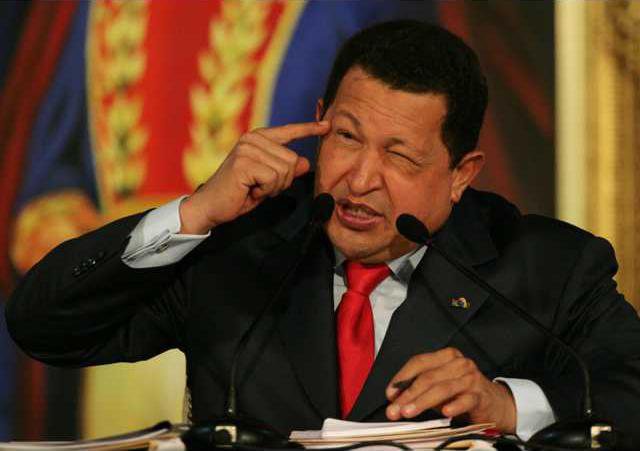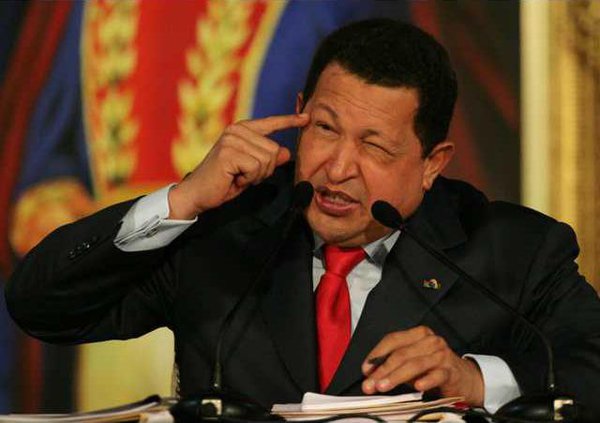CARACAS, Venezuela — As President Hugo Chavez prepared Thursday to send Venezuelan helicopters into Colombia to pick up three rebel-held hostages, he also hoped to mediate a broader settlement between leftist rebels and the U.S. backed Colombian government.
‘‘This is the start of a peace process in Colombia,’’ senior Venezuelan diplomat Rodolfo Sanz said Thursday. He said the handover of the hostages — including a mother, her young son and a Colombian politician held for more than six years — will happen between Friday and Sunday.
Chavez still hopes to speak directly to rebel leaders to try to help mediate in a broader peace effort, said Sanz, Venezuela’s vice foreign minister for Latin America.
By unilaterally handing over the three hostages to Chavez, Colombia’s largest rebel group demonstrated its eagerness to embarrass President Alvaro Uribe, who ended an earlier mediation effort by his socialist neighbor when Chavez tried to deal directly with Colombia’s army chief.
The three hostages’ release would be the most important in the Colombian conflict since 2001, when the Revolutionary Armed Forces of Colombia, or FARC, freed some 300 soldiers and police officers.
But both sides remain engaged in active warfare, and the fate of 44 other high-profile hostages — including politicians, police officers and three American defense contractors — hangs in the balance.
The three to be released this weekend are former Colombian congresswoman Consuelo Gonzalez, Clara Rojas — an aide to former Colombian presidential candidate Ingrid Betancourt — and Rojas’ young son, Emmanuel, reportedly born of a relationship with a rebel fighter.
Their relatives planned to fly to Caracas Thursday afternoon in hopes of finally being reunited, said Gonzalez’s daughter, Maria Fernanda Perdomo. She called it ‘‘a small light’’ of hope for the other hostages’ families as well.
Chavez has said he hopes the FARC’s goodwill gesture will lead to another group of hostages being freed, including Betancourt, a dual French-Colombian citizen who has received an outpouring of support in Europe.
Colombia on Wednesday approved Chavez’s plan, which is to fly Venezuelan aircraft marked with Red Cross insignia to the central Colombian city of Villavicencio, about 50 miles south of Bogota, and then take off in helicopters to meet the rebels and hostages at an unknown spot. The pilots would not be told exactly where they were going until they are in the air, for security reasons, Chavez said.
The hostages would later be flown from Villavicencio to an airport in Venezuelan territory, according to a letter sent by Venezuelan Foreign Minister Nicolas Maduro to his Colombian counterpart, Fernando Araujo.
Chavez mentioned several Venezuelan airports near the border where the hostages could be brought, including La Fria, Guasdualito and Elorza.
The Venezuelan leader said he hopes the captives will be able to ‘‘ring in the year 2008’’ with their families.
Yves Heller, a spokesman for the International Committee of the Red Cross in Bogota, said details were still being worked out and that the release could take a few days.
Uribe, whose father was killed in a botched rebel kidnapping, has taken a hard line against the FARC. The two sides have failed to agree to terms for a proposed swap of other rebel-held captives for guerrillas jailed in Colombian and U.S. prisons.
Chavez froze relations with Uribe after the Colombian president ended his mediation efforts last month, but now he has worked his way back into the center of the Colombian standoff.
To facilitate their delivery from rebel-held territory inside Colombia, Chavez proposed a commission to monitor the process, with observers from Bolivia, Ecuador, Argentina, Cuba, France and Brazil as well as Colombia, which appointed its top peace negotiator Luis Carlos Restrepo.
Argentina said its delegate, former President Nestor Kirchner, was traveling to Caracas on Thursday afternoon. Ecuador’s delegate, Gustavo Larrea, said observers would travel on to Villavicencio and then to wherever the hostages would be handed over.
———
Associated Press writers Toby Muse and Joshua Goodman in Bogota, Colombia; Tales Azzoni in Sao Paulo, Brazil; Jeanneth Valdivieso in Quito, Ecuador; Fabiola Sanchez in Caracas, Venezuela, and Debora Rey in Buenos Aires, Argentina, contributed to this report.
‘‘This is the start of a peace process in Colombia,’’ senior Venezuelan diplomat Rodolfo Sanz said Thursday. He said the handover of the hostages — including a mother, her young son and a Colombian politician held for more than six years — will happen between Friday and Sunday.
Chavez still hopes to speak directly to rebel leaders to try to help mediate in a broader peace effort, said Sanz, Venezuela’s vice foreign minister for Latin America.
By unilaterally handing over the three hostages to Chavez, Colombia’s largest rebel group demonstrated its eagerness to embarrass President Alvaro Uribe, who ended an earlier mediation effort by his socialist neighbor when Chavez tried to deal directly with Colombia’s army chief.
The three hostages’ release would be the most important in the Colombian conflict since 2001, when the Revolutionary Armed Forces of Colombia, or FARC, freed some 300 soldiers and police officers.
But both sides remain engaged in active warfare, and the fate of 44 other high-profile hostages — including politicians, police officers and three American defense contractors — hangs in the balance.
The three to be released this weekend are former Colombian congresswoman Consuelo Gonzalez, Clara Rojas — an aide to former Colombian presidential candidate Ingrid Betancourt — and Rojas’ young son, Emmanuel, reportedly born of a relationship with a rebel fighter.
Their relatives planned to fly to Caracas Thursday afternoon in hopes of finally being reunited, said Gonzalez’s daughter, Maria Fernanda Perdomo. She called it ‘‘a small light’’ of hope for the other hostages’ families as well.
Chavez has said he hopes the FARC’s goodwill gesture will lead to another group of hostages being freed, including Betancourt, a dual French-Colombian citizen who has received an outpouring of support in Europe.
Colombia on Wednesday approved Chavez’s plan, which is to fly Venezuelan aircraft marked with Red Cross insignia to the central Colombian city of Villavicencio, about 50 miles south of Bogota, and then take off in helicopters to meet the rebels and hostages at an unknown spot. The pilots would not be told exactly where they were going until they are in the air, for security reasons, Chavez said.
The hostages would later be flown from Villavicencio to an airport in Venezuelan territory, according to a letter sent by Venezuelan Foreign Minister Nicolas Maduro to his Colombian counterpart, Fernando Araujo.
Chavez mentioned several Venezuelan airports near the border where the hostages could be brought, including La Fria, Guasdualito and Elorza.
The Venezuelan leader said he hopes the captives will be able to ‘‘ring in the year 2008’’ with their families.
Yves Heller, a spokesman for the International Committee of the Red Cross in Bogota, said details were still being worked out and that the release could take a few days.
Uribe, whose father was killed in a botched rebel kidnapping, has taken a hard line against the FARC. The two sides have failed to agree to terms for a proposed swap of other rebel-held captives for guerrillas jailed in Colombian and U.S. prisons.
Chavez froze relations with Uribe after the Colombian president ended his mediation efforts last month, but now he has worked his way back into the center of the Colombian standoff.
To facilitate their delivery from rebel-held territory inside Colombia, Chavez proposed a commission to monitor the process, with observers from Bolivia, Ecuador, Argentina, Cuba, France and Brazil as well as Colombia, which appointed its top peace negotiator Luis Carlos Restrepo.
Argentina said its delegate, former President Nestor Kirchner, was traveling to Caracas on Thursday afternoon. Ecuador’s delegate, Gustavo Larrea, said observers would travel on to Villavicencio and then to wherever the hostages would be handed over.
———
Associated Press writers Toby Muse and Joshua Goodman in Bogota, Colombia; Tales Azzoni in Sao Paulo, Brazil; Jeanneth Valdivieso in Quito, Ecuador; Fabiola Sanchez in Caracas, Venezuela, and Debora Rey in Buenos Aires, Argentina, contributed to this report.

